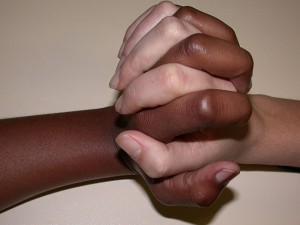So you have a racist, sexist, homophobic, white supremacist friend. Your racist friend is perfectly affable to you, buys you beers, likes to chat about the football and whatever. But you are white and male and straight, so of course he is nice to you. And he doesn’t challenge your world-view, or your assumptions about how the world works, because both you and he are white, straight, and male.
But you know what they say: a person who is nice to you, but not nice to the waiter, is not a nice person.
One of your acquaintances, on the other hand, points out (on a fairly regular basis) that Black Lives Matter, that there is racism and white supremacism rampant in your community. He (or she) makes you uncomfortable, because s/he challenges your assumptions, and makes you aware that you might have straight/white/male privilege. You are unable to separate out his calls for social justice from other aspects of his personality that irritate you. Maybe he isn’t actually irritating by any general standard, you just find him irritating because he makes you think about topics you would rather not think about.
So what are you gonna do about it?
Apparently one answer is to do a public character assassination on the anti-racist acquaintance, claiming that he is abrasive and difficult.
In the feminist and anti-racist communities, this is called “tone policing“. It is the assertion that people who demand social justice (as opposed to asking for it politely) are automatically wrong for demanding equality and inclusion. In the anti-racist community, it’s also called “being an apologist for racism”. People who are on the receiving end of racism, sexism, and homophobia (and other forms of oppression) have a right to be angry:
Nobody was ever given rights by politely asking for them. Politeness is nothing but a set of behavioral expectations that is enforced upon marginalized people.
If you see someone who is angry and upset about something that was said or done to them, don’t tell them they should be nicer. Instead: Recognize their emotions as valid. Recognize that their emotional state is an indication that something extremely harmful was done to them, whether it was by you, or someone else. Work to understand why the action was oppressive. Take all that energy that you’re wasting being so concerned with how people are responding to their own oppression, and channel it into fighting oppression.
Another answer is to say, well, y’know, I don’t like the anti-racist guy, but he is right about calling racism out in my community, so even though he gets up my nose, I will stand with him on this one issue. And the racism of racist guy is so extreme that I am going to have to dissociate myself from his white supremacist views, and call him out on them publicly.
Regardless of whether you find racist guy to be an affable dude to hang out with, and anti-racist guy to be a bit of a douche: racism is wrong, and white supremacism is even wronger. That means racist guy is not an affable dude; he’s an asshole.
And as The Specials so memorably put it, If you have a racist friend, now is the time, now is the time for your friendship to end
.
But apparently some people just want a quiet life.
Well, I don’t want to see racism, white supremacism, or apologies for racism on Patheos. And I don’t want to see character assassination of individuals on Patheos. So I agree with John Beckett: Racism cannot be tolerated, and Stephen Abell should no longer be welcome to post on Patheos Pagan.

















